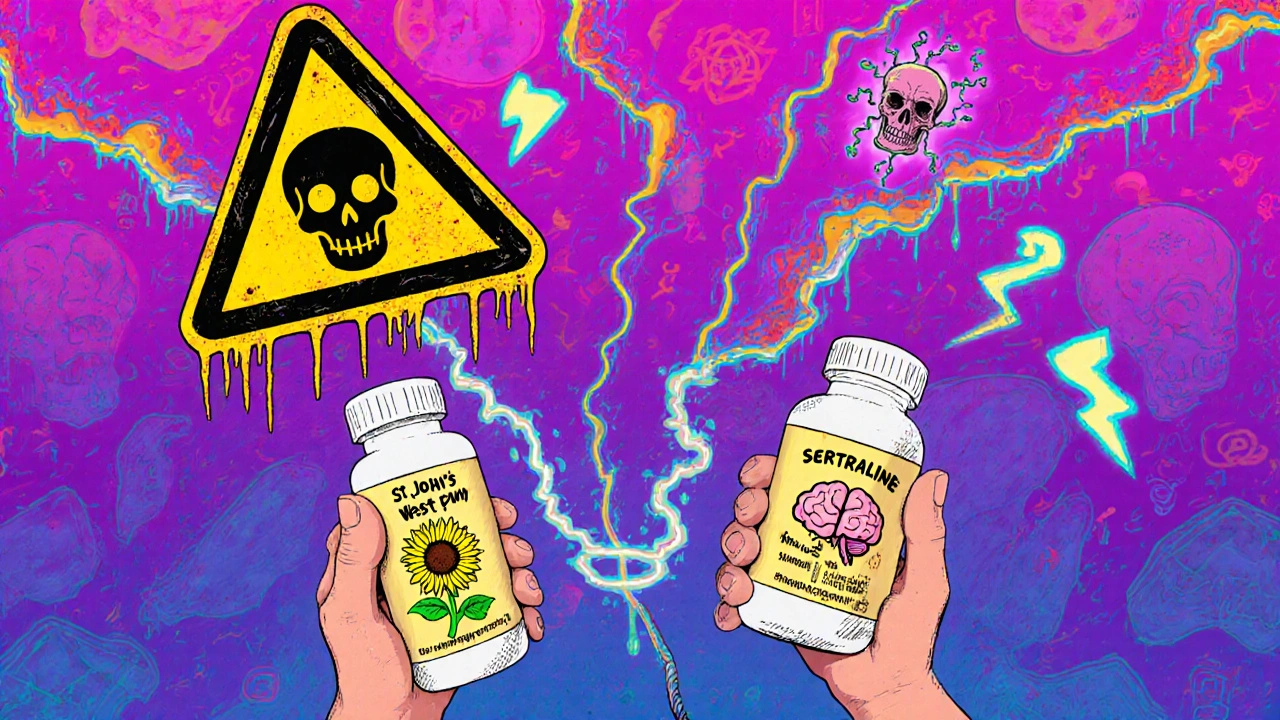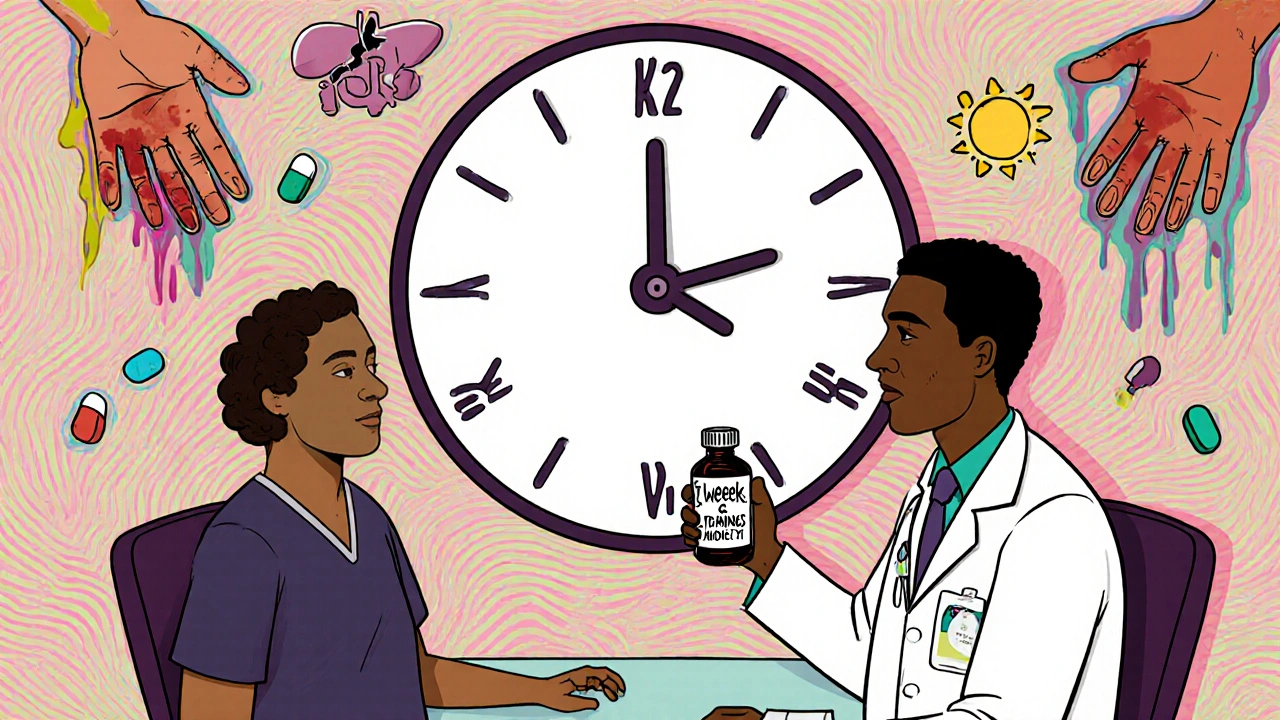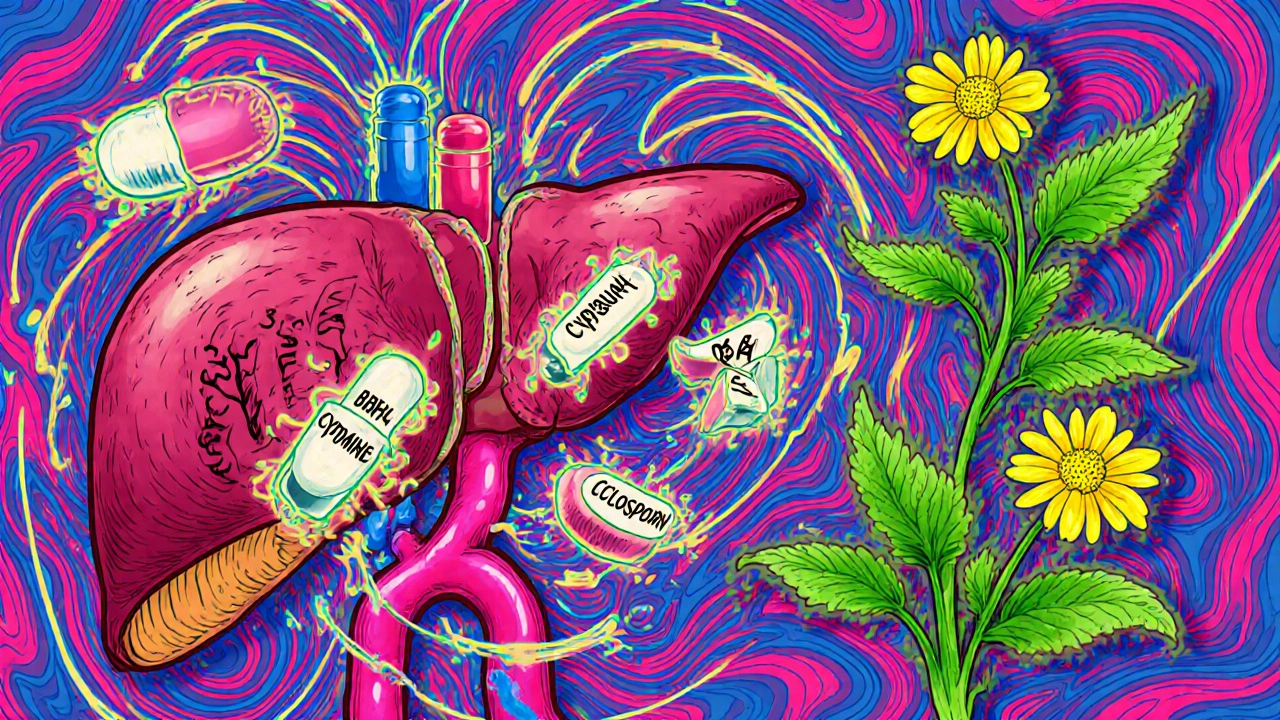Many people turn to St. John’s Wort thinking it’s a safe, natural way to manage mild depression. But here’s the truth: St. John’s Wort isn’t harmless. It can quietly cancel out your prescription meds-sometimes with dangerous results.
How St. John’s Wort Changes How Your Body Handles Medicines
St. John’s Wort doesn’t just sit in your system. It actively rewires how your liver processes drugs. It turns on enzymes-especially CYP3A4-that break down medications faster than normal. Think of it like a speed dial for your body’s drug cleanup crew. The result? Your pills don’t last long enough to work.
This isn’t guesswork. Over half of all prescription drugs are metabolized by CYP3A4. That means St. John’s Wort could mess with heart meds, antibiotics, cancer drugs, and even birth control. It also kicks in P-glycoprotein, a protein that shoves drugs out of cells. So even if your liver doesn’t break it down, your body still flushes it out before it can help.
The problem? Not all St. John’s Wort supplements are made the same. One bottle might have enough hyperforin to trigger serious interactions. Another might be too weak to help depression-but still strong enough to ruin your medication. There’s no standard. No safety net.
Medicines That Stop Working With St. John’s Wort
Here’s what happens when you mix St. John’s Wort with common prescriptions:
- Birth control pills: Your body breaks down hormones faster. Unplanned pregnancy isn’t a myth-it’s a documented risk. Breakthrough bleeding? That’s your body screaming it’s not working.
- Warfarin (Coumadin): This blood thinner becomes less effective. You’re at higher risk for clots, strokes, or pulmonary embolism. One case in Australia led to a life-threatening clot after someone started St. John’s Wort.
- Phenytoin, carbamazepine, phenobarbital: These seizure meds lose their punch. Seizures can return-or get worse. People have been hospitalized because they didn’t know the herbal supplement was the cause.
- Tacrolimus and cyclosporin: Used after organ transplants to stop rejection. St. John’s Wort drops their levels so low, your body attacks the new organ. Transplant rejection isn’t rare in people taking this combo.
- Antiretrovirals (HIV meds): Protease inhibitors and NNRTIs get broken down too fast. Viral load spikes. Treatment fails. This isn’t theoretical-it’s been reported in clinical cases.
- Methadone: Used for pain or addiction. St. John’s Wort can trigger withdrawal symptoms or reduce pain control. People have needed emergency dose adjustments after starting the supplement.
- Omeprazole (Prilosec): This acid reducer becomes useless. Heartburn returns. The interaction is so strong, it’s been proven in controlled studies.
And that’s just the tip of the iceberg. The Therapeutic Goods Administration in Australia says the list isn’t complete. New interactions pop up every year.
The Serotonin Danger: When St. John’s Wort and Antidepressants Collide
People often take St. John’s Wort because they want to avoid SSRIs like sertraline or fluoxetine. But combining them? That’s where things turn deadly.
Both raise serotonin levels. Together, they can trigger serotonin syndrome-a condition where your nervous system goes into overdrive. Symptoms include high fever, rapid heart rate, confusion, muscle rigidity, seizures, and in extreme cases, death.
The American Academy of Family Physicians says this combo is not recommended. And yet, people still do it. They think, “It’s natural, so it’s safe.” But natural doesn’t mean gentle. One study found that 20% of serotonin syndrome cases linked to herbal supplements involved St. John’s Wort.
And it’s not just SSRIs. Triptans for migraines, certain painkillers like tramadol, even some cough syrups with dextromethorphan-mix any of these with St. John’s Wort and you’re playing Russian roulette with your brain chemistry.

What Happens When You Stop Taking St. John’s Wort?
Most people think the danger ends when they quit the supplement. Wrong.
Once you stop, your liver enzymes calm down. But your prescription meds? They’re still at the same dose. Now they’re not being broken down as fast. So levels spike.
That means:
- Warfarin could cause dangerous bleeding.
- Antidepressants might trigger serotonin overload.
- Cyclosporin could poison your kidneys.
The TGA documented six cases in Australia where patients developed toxicity after stopping St. John’s Wort. Doctors didn’t adjust doses because they didn’t know the person had been taking it.
This is why you can’t just quit cold turkey. You need a plan. A doctor. Monitoring. Time.
Photosensitivity and Other Side Effects
St. John’s Wort isn’t just dangerous because of drug interactions. It has its own side effects.
Up to 10% of users report increased sensitivity to sunlight. That means sunburns faster. Rashes. Even blistering after brief exposure. This isn’t just annoying-it’s a burn risk. People in Australia, where UV levels are high, have reported severe reactions.
Other common side effects: dry mouth, dizziness, fatigue, anxiety, and gastrointestinal upset. In rare cases, it can trigger mania in people with bipolar disorder. One study found 3 out of 10 patients with bipolar disorder who used St. John’s Wort had manic episodes.

What Should You Do If You’re Taking St. John’s Wort?
If you’re on any prescription meds, stop taking St. John’s Wort-today. Don’t wait. Don’t “try it for a week.”
Then, talk to your doctor or pharmacist. Bring the bottle. Show them the label. Even if you think it’s “just a supplement,” they need to know.
They’ll check:
- Which meds you’re on
- Whether any interact
- Whether you need a blood test (like INR for warfarin)
- How to safely stop and monitor
If you’re using it for depression, ask about alternatives. There are safer herbal options. There are low-dose prescription options. There are therapy programs. You don’t have to risk your health for a supplement with no quality control.
Why This Isn’t Just a “Natural Remedy” Issue
St. John’s Wort is sold in pharmacies, health food stores, and online. It’s labeled “natural.” “Herbal.” “Safe.” But it’s not regulated like medicine. No standard dose. No testing for purity. No warning labels in many countries.
Sweden and the UK require warnings on both the supplement and the interacting drugs. Australia and New Zealand issue public alerts. The U.S. FDA doesn’t require interaction labels on supplements.
That means you’re on your own. You have to know. You have to ask. You have to speak up.
Doctors and pharmacists aren’t mind readers. If you don’t tell them you’re taking St. John’s Wort, they can’t protect you.
Final Thought: Natural Doesn’t Mean Safe
St. John’s Wort isn’t evil. It’s powerful. And power without oversight is dangerous.
Thousands of people take it without problems. But thousands more don’t know they’re at risk. The interactions aren’t rare. They’re common. They’re predictable. And they’re deadly.
If you’re on medication, skip it. If you’re thinking of trying it, talk to a professional first. Your body doesn’t care if it’s natural. It only cares about what’s in your bloodstream-and whether it’s safe to be there.
Can I take St. John’s Wort with my antidepressant?
No. Combining St. John’s Wort with SSRIs, SNRIs, or other antidepressants can cause serotonin syndrome-a potentially life-threatening condition. Symptoms include high fever, confusion, rapid heartbeat, muscle stiffness, and seizures. Even if you’ve taken it before without issues, the risk increases with long-term use or higher doses. Always consult your doctor before combining any herbal supplement with psychiatric medication.
Does St. John’s Wort affect birth control?
Yes. St. John’s Wort speeds up the breakdown of estrogen and progestin in birth control pills, patches, and rings. This lowers hormone levels enough to cause breakthrough bleeding and increase the risk of unplanned pregnancy. Even if your period still comes, you’re not protected. IUDs and implants are less affected, but experts still recommend avoiding St. John’s Wort if you’re using any form of hormonal contraception.
How long does St. John’s Wort stay in your system?
The active compound hyperforin can induce liver enzymes for up to two weeks after you stop taking it. That means your body continues to break down other medications faster during this time. For safety, most doctors recommend waiting at least two weeks before starting or stopping any prescription drug after using St. John’s Wort. Blood tests may be needed to check drug levels during this transition.
Is St. John’s Wort regulated like a drug?
No. In most countries, including the U.S. and Australia, St. John’s Wort is sold as a dietary supplement-not a medicine. That means manufacturers don’t have to prove it works, test for consistency, or warn about interactions on the label. One bottle may contain 0.3% hyperforin; another may have 3%. The difference can mean the difference between no effect and a dangerous interaction.
Can I take St. John’s Wort if I’m not on any medication?
Even if you’re not on prescription meds, there are risks. St. John’s Wort can cause photosensitivity, leading to severe sunburns. It may trigger anxiety, insomnia, or mania in people with bipolar disorder. It can also interact with over-the-counter drugs like ibuprofen or cold medicines. If you’re considering using it, talk to a healthcare provider first. There are safer, better-studied options for managing mild depression.

Alex Ramos
Bro, I took St. John’s Wort for a month while on Zoloft because I thought ‘natural’ meant safe. Ended up in the ER with serotonin syndrome. Fever, shaking, felt like my brain was melting. Don’t be me. Talk to your doctor before you touch this stuff. 😵💫
Amie Wilde
My mom took it with her blood thinner. Almost died. Just say no.
Gary Hattis
As someone who’s lived in three countries, I’ve seen how wild the supplement game is. In the US, it’s sold like candy. In Germany, it’s prescription-only. In Australia, they slap warning labels on it like it’s nuclear waste. Meanwhile, here? You can buy it next to gummy vitamins. No oversight. No accountability. Just profit. And people wonder why we have a healthcare crisis.
Esperanza Decor
I’ve been researching this for my dad-he’s on cyclosporin after his kidney transplant. I didn’t even know St. John’s Wort could cause rejection. I’m printing out the TGA report and handing it to his pharmacist tomorrow. If you’re using this stuff, you owe it to yourself and your family to know the risks. This isn’t just about depression-it’s about survival.
Deepa Lakshminarasimhan
They don’t want you to know this, but Big Pharma paid off the FDA to let this slide. St. John’s Wort works better than SSRIs for mild depression, but they can’t patent it. So they let people die so they can sell you $200/month pills. The real danger isn’t the herb-it’s the system that lets it be sold without warnings. Check the hyperforin levels. If it’s not listed, it’s a scam.
Erica Cruz
Wow. Such a well-researched post. Truly groundbreaking. I mean, who knew herbal supplements could interact with drugs? Next you’ll tell me water can drown people. 🙄
Johnson Abraham
lol why are people so scared of herbs? I take it with my antidepressants and i feel better. u just dont know how to take it. also i think the FDA is corrupt. #naturalhealing
Shante Ajadeen
Thank you for writing this. I’m so glad someone finally said it plainly. My sister almost lost her transplant because she didn’t tell her doctor she was taking it. Please, if you’re reading this and you’re on meds-don’t guess. Ask. Even if it feels awkward. Your life matters more than pride.
dace yates
Does this interaction happen with all forms of St. John’s Wort? Like teas vs. capsules? I’ve only had the tea and I’m wondering if it’s less risky.
Danae Miley
Correction: The Therapeutic Goods Administration (TGA) in Australia doesn’t just ‘say the list isn’t complete’-they actively monitor and update their database of herb-drug interactions quarterly. The FDA’s lack of mandatory labeling is a regulatory failure, not an oversight. This is a systemic issue in U.S. dietary supplement policy, not an isolated case.
Charles Lewis
It is imperative that we recognize the profound public health implications of unregulated botanical supplements. The pharmacokinetic mechanisms underlying St. John’s Wort’s interactions-namely, the induction of cytochrome P450 3A4 and P-glycoprotein efflux transporters-are well-documented in peer-reviewed literature spanning decades. The danger is not anecdotal; it is quantifiable, reproducible, and clinically significant. The fact that consumers are routinely misled by marketing claims of ‘natural safety’ underscores a critical gap in health literacy. Healthcare providers must proactively screen for herbal supplement use during every clinical encounter-not merely when patients volunteer the information. Furthermore, public health campaigns should mirror the regulatory rigor seen in the European Union and Australia, where product labeling mandates clear contraindications. The autonomy to choose supplements must be balanced with the responsibility to be informed. This is not about fearmongering; it is about evidence-based patient safety.